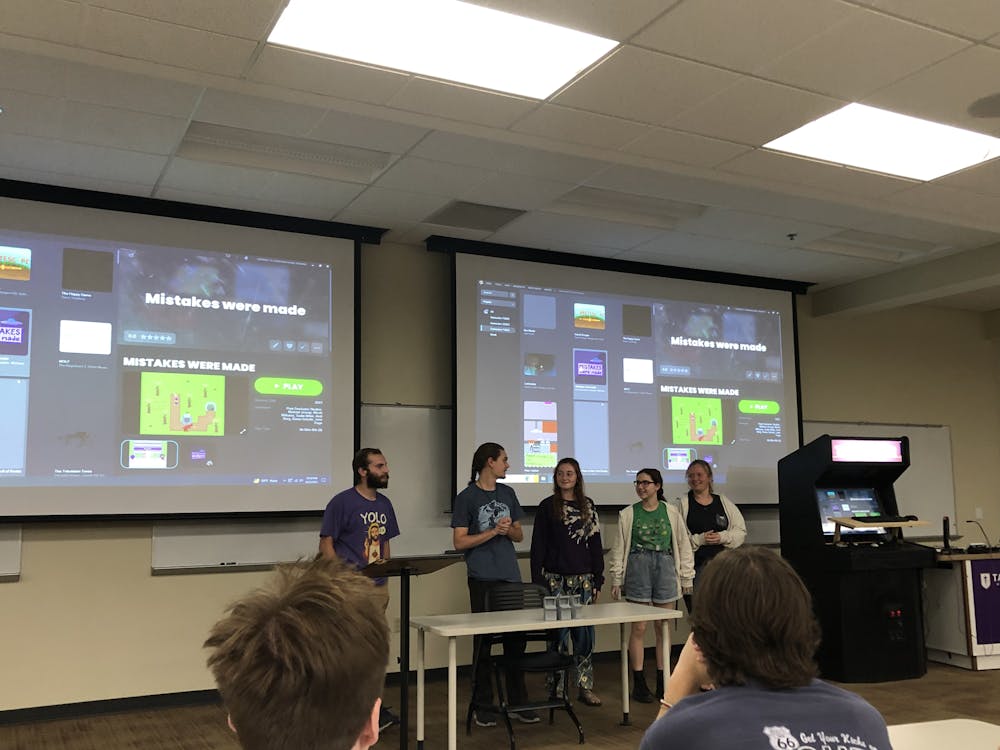On Sept. 24, Taylor University’s 20th GameJam concluded at 12:15 a.m. Sunday morning.
GameJam is a tournament in which students create a video game from scratch in only 24 hours. Last week, ten teams competed. The groups developed code, game design and music.
“I always like seeing how students have come in with zero experience, end up with a game in the end, and they can show it off even if it's really simple,” Jon Denning, department co-chair and associate professor of computer science and engineering, said. “It's just fun to see them put their skills towards something that they can share with their friends who are not computer scientists, and their friends can even enjoy and be part of it.”
Most of the action took place in the Euler Science Complex in room 217.
Collections of students sat in rolling chairs, huddled around their computers. Packaged snacks clustered on top of a white table. Saturday morning, the table’s contents changed from cookies and packaged goodies to hot chocolate, coffee and donuts.
“I'm hoping we will create a fun, interesting game for everyone to play,” Sophomore Kelden Wright said. “And we'll be able to get some laughs out of it — be able to get some good times — a few screams, more than a few screams given some of the enemies in our game.”
What was surprising was that the majority of students competing had not participated in GameJam before, Wright said. Once submissions started, Wright believed that the ideas and creativity for blooming computer science majors were fantastic.
The biggest obstacle participants faced in creating their games was figuring out how to make a game that someone would enjoy.
“It really is the hardest part because you think of games that you play, right?” Wright said. “What makes them fun? How do you answer that question in an objective way that you can implement?”
Yet, despite the tight time pressure, Wright believed it to be truly spectacular to see teams rise up to the challenge — no matter what level they are at.
The tournament ended with team presentations and a vote for the GameJam winner.
The top three GameJam winners were the following: 1st place — “Luminosity,” 2nd place — “Molf” and 3rd place — “Mistakes were Made”.
Every game was judged based on the team’s use of music, design, code and the application of the theme: The more you have, the worse it is.
“I know a lot of people look forward to the final showcase when you get to see both your hard work being presented and also everyone else's hard work,” Wright said. “This is 24 hours, eight of which are usually spent sleeping. The rest of which you are hard at work, pushing to get this game to completion.”
Beginning Thursday, teams collaborated on developing story ideas and choosing music and art styles for their game — but no coding allowed. Friday, the participants could begin their coding at 6 p.m.
Saturday marked the finale.
The finale took place in Euler, room 109. All GameJam participants took turns in front of the room, explaining their game. For each presentation, an audience member volunteered to play one of the games.
Everyone watched the game, projected onto the screen, as the volunteer played on the “TaylorCade.”
Freshman Sadie Miller, a professional writing and illustration major, helped design the “Mistakes were Made” game. Miller said that the GameJam experience forced her to create a large quantity of art in such a short amount of time, enhancing her skills.
For some students, GameJam did not go as anticipated.
“I thought GameJam would be me and Michael programming over the entirety of 24 hours with just power drinks and like caffeine out the wazoo,” Sophomore Micah Williams said.
He did not expect to receive eight hours of sleep.
GameJam began in 2014 at Taylor University. In previous years, Denning said that teams started programming right after the theme was announced rather than thinking and iterating over different designs. So Denning and his team switched it up.
Thursday nights now ease GameJam into a “soft start.” That way the participants are forced to really think about their games, which caused a lot of the games to be more interesting, Denning said.
Denning said that students do not need to be computer scientists to participate. Journalists, English and art majors join GameJam too, writing dialogue or creating digital art. He recalled a time when musicians hid away in a room to record music for one of the GameJam competitions.
“No matter where you're at, GameJam has something for you because you can join a team of experienced programmers, and you can join a team of friends who also don't know a lot — and learn together,” Wright said. “And truly, GameJam is not about creating a perfect game. It's about creating a perfect time.”





